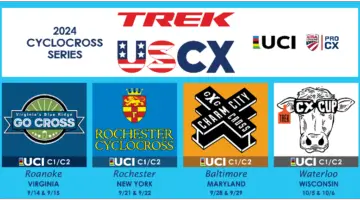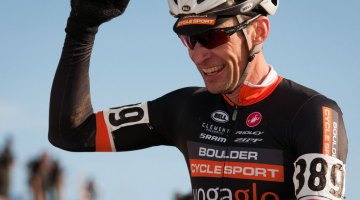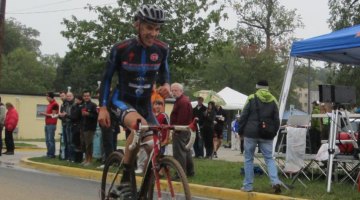by David Einmo
A mechanical might steal your spot on the podium, but it doesn’t have to rob you of your enthusiasm. Stop playing the “what if” game and come back strong. The cyclocross races may be over, but spring ushers in a new mountain bike and road racing season. Below, we ask top pro cyclocross racers and coaches to share their strategies for overcoming frustration and ringing in a new season in Part 1 of this two part series. For more advice, check back soon for Part 2!
Jonathan Page
Four-Time U.S. National Cyclocross Champion

Jonathan Page had a bad run at Nationals but ended up top American at Cyclocross Worlds in Hoogerheide. © Thomas Van Bracht
During the 2013 World Cyclocross Championships, four-time U.S. National Cyclocross Champion, Jonathan Page was well on his way to a top-10 finish. Then bad luck sabotaged the veteran pro. His chain shifted into his rear wheel, forcing his bike to a halt. Later a flat tire compounded the delay. Page went on to finish an impressive 22nd, but losing his shot at another podium after finishing second at Worlds in 2006, was admittedly hard to process at first, he says.
“That was tough,” recalls Page, who was riding as the top-placed American before the mishaps displaced him. “There have been others that tough as well. The day before my daughter was born in St. Wendel, Germany, for instance. Same situation, only then I was possibly top five. I play the ‘what if’ game for a while and then I just have to say to myself (and to anyone else who starts to play it later), ‘now it’s enough. Move forward. You’ll have your chance. That’s cycling.’
Tim Johnson
Six-Time U.S. National Cyclocross Champion
Veteran cyclocross ace Tim Johnson can relate. Events during the race are often outside even the most experienced racer’s control. While sliding around muddy corners, descending down rooted trails, and rapidly dismounting the bike to jump over barriers, random acts can spoil a winning ride.
“I’ve had a flat tire on the last lap of the World Championship when I’ve been top 10, and I’ve crashed no fault of my own in the World Championships while I’m top 10,” recalls Johnson. “But I’ve also had days where luck has gone my way and I’ve stood upright when I should have crashed. So I realize it’s not in my control and it’s something that just happens. I might be frustrated and say it would have been so much better if…” But I really don’t have control over that. What I do have control over is those other things that got me there in the first place.”
Geoff Proctor
US National Junior/U23 Cyclocross Coach, Director of EuroCrossCamp
One of those key elements to success is surrounding yourself with the right people, says Geoff Proctor, U.S. National Junior/U23 cyclocross coach and director of EuroCrossCamp.
“Here is where I believe being a member of a team is critical,” says Proctor. “At EuroCrossCamp or with Team USA at Worlds, we build a community first. All the riders are from different teams and they’re racing in a foreign country. Each night, we go over the day, the training or the race. I try to maybe emphasize a character trait each day. We process things as a group. This provides a sort of forum for individual riders to process their issues and concerns. And then, we move on. Look at any great rider. How many separate but important moments of mishap and éclat! The trick is to help younger riders see the big picture. The 10-year picture. And not focus too much pressure on any one race.”
Stay tuned for Part 2 and make sure you’re subscribed for the upcoming Summer issue of Cyclocross Magazine for more strategies from top pros on how to use sports psychology to improve your cycling performance.


























